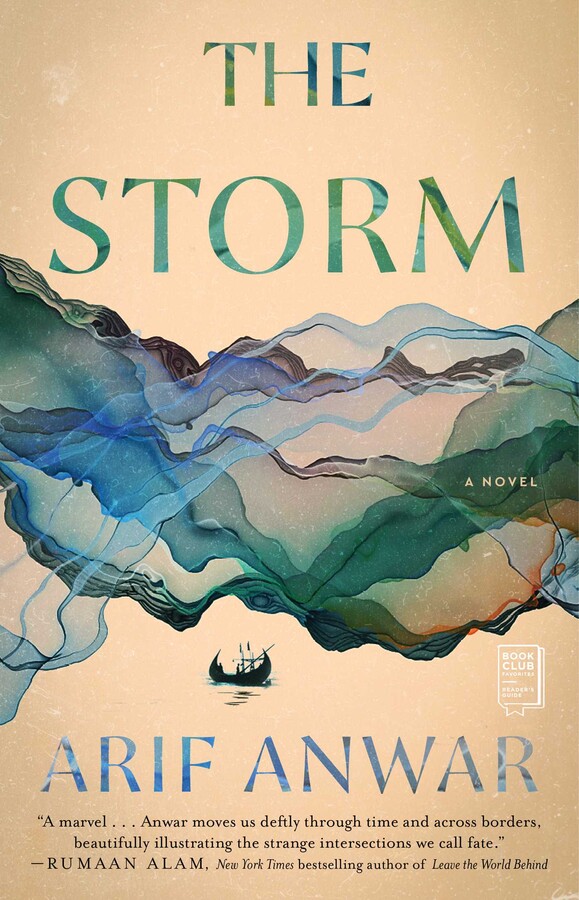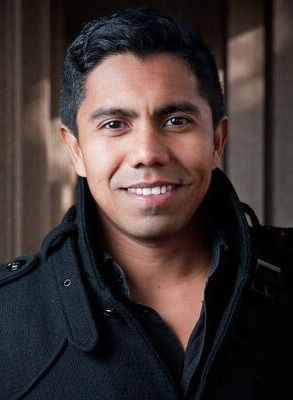Click here to return to the world eco-fiction series
About the Book

Rebooted for November 2025
At once grounded in history and fantastically imaginative, Arif Anwar’s The Storm (Washington Square Press, 2021) “moves us deftly through time and across borders, beautifully illustrating the strange intersections we call fate, and reminding us how the past shapes the present” (Rumaan Alam, author of Rich and Pretty). Exploring the humanity that connects us beyond the surface differences of race, religion, and nationality, “this powerful and important debut is a story for our time” (Library Journal, starred review).
Shahryar, a recent PhD graduate and father of nine-year-old Anna, must leave the United States when his visa expires. In their last remaining weeks together, we learn Shahryar’s history, in a village on the Bay of Bengal, where a poor fisherman and his wife are preparing to face a storm of historic proportions. That story intersects with those of a Japanese pilot, a British doctor stationed in Burma during World War II, and a privileged couple in Calcutta who leaves everything behind to move to East Pakistan following the Partition of India. Inspired by the 1970 Bhola cyclone, in which half a million-people perished overnight, the structure of this riveting novel mimics the storm itself. Building to a series of revelatory and moving climaxes, it shows the many ways in which families love, betray, honor, and sacrifice for one another.
Chat with the author
Mary: We’ll chat about your novel The Storm, but first, can you let readers know more about you and your background?
Airf: I was born in Bangladesh, in Chittagong, which is right by the Bay of Bengal where The Storm is set. I was always an avid reader, ever since childhood, and I cut my teeth on the classics such The Odyssey, The Iliad, Ramayana, Mahabharat, Shakespeare, Dickens, you name it, first in Bangla. I didn’t start reading and writing in English until the fourth standard, when my parents switched me to a English Medium instruction school. I’ve retained my love for both languages ever since. I’d say I probably prefer reading in Bangla, but English is by far my stronger writing language.
I wasn’t a career writer until my forties, when The Storm came out. It’s unusual that my first piece of published creative writing work was my novel. I’d always been an avid reader rather than a writer, and until the germ of the idea for this novel seized me, it never occurred me to put pen to paper with the intent of writing fiction.
I’ve been fortunate to work in the Education and International Development sector. I’ve worked for NGOs such as BRAC and UNICEF, from everywhere including in Myanmar and Bangladesh. I’d like to think my varied background and work experience enriches my writing.
Mary: I first became interested in the novel because I like to read books that show how environmental issues, whether natural or human-caused, affect the human story. In 1970, East Pakistan (now Bangladesh) experienced the deadliest humanitarian disaster in history when at least 300,000 died in the Bhola Cyclone. You based your novel on this storm. What led you to write this story?
Arif: Well, as you noted, the number killed was extraordinarily tragic. But barely anyone outside of Bangladesh even knows about this event, which was possibly the deadliest natural disaster in human history. Bangladesh is a relatively younger country, having gained our independence in 1971. So the Liberation War of that year casts a big shadow over our literature. I wanted to explore something different, an equally big event that happened the year before (the cyclone). But rather than focus on the immensity of its scale, I wanted to narrow it down to the experience of a single family living near the shore.
Mary: What’s interesting to me is how people handle disasters, but your novel shows a tapestry of three generations of people related to a fictional character and her family who were in the storm. The timeline relates an epic story and scale surrounding the actual storm itself. It seemed to give weight to a singular disaster by revealing a large history of things leading up to it and coming after it, such as the experiences of real people. It’s quite an impressive feat! How did you manage to write this epic story so that it reads at a good pace? How did you manage the timeline?
Arif: Thank you! It wasn’t easy. My philosophy is that every novel should be a page-turner, whether a literary epic or an airport thriller. If the reader finds it a chore to turn the pages, what’s the point? I knew that I wanted an epic story that still moved at a fast pace, because I don’t ever want to write something that I wouldn’t want to read myself. So I kept aiming for that sweet spot of richness of depth of writing and language, while still keeping the story moving.
The timeline was very challenging. I was pulling my hair out over it often. At some points it felt more like an engineering challenge than a writing challenge, like some scientist banging his head against a chalkboard filled with complex equations. But in the end I pulled it off, and I’m not entirely sure how. Long walks by myself helped. That’s what Stephen King uses when he encounters a challenging point in the story.
Mary: The story also reveals historical context: wars, religious and class divisions in India and Bangladesh, immigration issues, and more. So, again, you give a detailed viewpoint, which helps the reader understand the perspectives of its characters. Do you have anything to add to this part of the human story?
Arif: Just that history never ends, and we are surrounded by it constantly. The lives of some are more buffeted by the winds of history than others, and I wanted to capture that in the novel. You cannot write about human beings without writing about what surrounds them, literally and figuratively.
Mary: I agree. The cyclone itself is echoed in riptides of other emotional storms happening throughout the novel as characters’ lives are lived, which gives credence to the title of the novel, but the Bhola cyclone really was an awful tragedy that killed so many people. Were you alive when it happened, and what memories do you have of it growing up—or what stories did you hear when growing up?
Arif: Thankfully I was not, although I was born not far from where the worst of it hit. My mother did witness that dawn though, and she says that she has never seen the sky so red as it was that morning. That’s stayed with me.
Mary: During such grand disasters, which we are sure to see more of with increasing climate changes, do you think that people are largely good to one another or not? It seems like in the (much smaller) disasters I’ve been in, neighbors help each other out, people come together, and so on.
Arif: I do think that people are innately good, and with the inevitable exceptions, disasters in Bangladesh has always brought people together. There’s just so many of us in such a small place, we have no choice but to band together.
In a way, Bangladesh has been a preview of what was coming for the world for the past half century. We’ve grown much stronger and resilient over the years, and storms and natural disasters now claim much fewer lives. But with climate change it feels like years of progress will be undone. Countries like Bangladesh pay the price for the emissions of much larger and richer nations. The city of Sydney, Australia, for example, emits as much CO2 as all of Bangladesh.
Mary: I think one thing we need to remember, and perhaps what your story reminds us, is that despite statistics and news bits and bytes, disasters involve people with full lives—histories and ancestors, descendants and future possibilities—that each of us is an important part of the tapestry of life. Life is not always linear, as we see toward the end of the book when a character experiences things with her eyes, skin, and other organs and each of these pieces also has a unique and rich history that flash backward and forward. Memory serves us well in living/reliving incidents at the same time. Any thoughts on that?
Arif: I think you’ve summarized the themes of The Storm so well that anything I add would be ‘gilding the lily’. Thank you for such a close and thoughtful reading of my book.
Mary: Thank you, Arif, for an enjoyable, rich novel and for taking the time to chat with me.
About the Author

Arif Anwar was born in Chittagong, Bangladesh, just miles from the Bay of Bengal. He has previously worked for BRAC, one of the world’s largest Non-Governmental Organizations, on issues of poverty alleviation, and for UNICEF Myanmar for public health issues. Arif has a PhD in Education from the University of Toronto. He currently lives in Toronto Canada, with his wife Si (Sandra) Lian. The Storm is his first novel.
The global novel exists, not as a genre separated from and opposed to other kinds of fiction, but as a perspective that governs the interpretation of experience. In this way, it is faithful to the way the global is actually lived—not through the abolition of place, but as a theme by which place is mediated. Life lived here is experienced in its profound and often unsettling connections with life lived elsewhere, and everywhere. The local gains dignity, and significance, insofar as it can be seen as a part of a worldwide phenomenon.
-Adam Kirsch, The Global Novel: Writing the World in the 21st Century